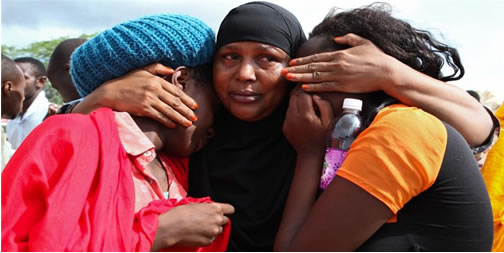Monday April 6, 2015
by Muuse Yuusuf

Kenyans comfort each other after the massacre
Heart-broken
relatives, families and Kenyans in general are mourning for the death of
students who were killed by Al Shabaab fighters at the Garissa university
college. They cannot understand the reason why innocent students, who went to
university to improve their life and the lives of their fellow Kenyans, had to
meet violent death at the hands of this murderous terrorist cult, which has mainly
been terrorising Somalis.
The murdered
students were singled out by crazed and brain-washed terrorists for the
slaughter for belonging to a different faith in this multi-faith and ethnic
country!
The incident has again given Al Shabaab a
wider publicity for their organisation and their “cause”, their claim that
their action is a revenge for the invasion of Kenyan forces of Somalia in 2011.
They have also shown that, although their power and influence have been
weakened, a handful of well-organised and well-motivated individuals can stage
deadly and spectacular guerrilla attacks on civilian targets, such as schools, reminding
us of the terrorist attacks on a school in Peshawar in Pakistan, where hundreds of many innocent children were
murdered by terrorists.
The Kenyan government and the public are
in deep shock to see a college full of diligent students blown up by a
ferocious fight by a handful of terrorists. It is particularly heart-breaking
for the Kenyan government to watch its citizens butchered inside its territory by
Al-Shabaab, the same organisation, which prompted its forces to invade Somalia
in 2011.
Indeed, it is more than three years since
the invasion and anyone who analyses the current situation on the ground can
see the following scenarios becoming reality as the days go by.
If the invasion was meant to protect Kenyan
citizens and country’s tourism industry from bombings and kidnappings by
terrorists, it has failed to do so. Let alone protect the tourism resorts of
Mombasa and Malindi, bombings became normal features in Nairobi as evidenced by
the Eastleigh bus bombing in 2012, the Westgate mall incident and now the
Garissa massacre. Three years ago, who
would have thought bombs planted by Al-Shabaab would explode in Nairobi,
equating this beautiful metropolitan city to the war-torn Mogadishu in terms of
insecurity?
If the military adventure was aimed at
securing Kenya’s borders with Somalia, insecurity along the border is worse
than ever, a classical example is Al-Shabaab’s current attack on Garissa
university college.
Although Kenyan forces have helped the
Somali government to remove Al-Shabaab from some regions, including the
strategic port town of Kismayo, it seems though the problem has shifted to
Kenya, particularly the Somali region where insecurity has increased compared
to the situation prior to the invasion.
Crackdowns and raids on towns in the
Somali region in Kenya by the Kenyan security forces demonstrate the gravity of
the situation inside the country. In
2012, Garissa, a city of 350km north-east of Nairobi, the same town where the massacre of students happened, was
reported to be a “ghost” town after sweeping security operations mounted by the military, causing the death of
many people, including students.
Considering the history of this volatile
region, it is this author’s firm believe that border countries or front line
states, Kenya and Ethiopia, should be excluded from any peace-keeping or
peace-enforcement operations because their presence will only complicate the
situation. As we all know the Ethiopian
invasion helped create Al-Shabaab and extremism, the opposite of what the
military adventure was supposed to achieve.
Indeed, the UN Security Council has
prohibited front-line state from becoming part of peace-keeping/enforcement
forces. Unfortunately, Ethiopia and Kenya failed to respect the will of the
international community and their forces invaded Somalia in 2006 and 2011
respectively. This is again demonstrates how these two countries, who have been
conspiring against Somalia, are willing to use force against a broken country
for fear of Somali nationalism.
So when dealing with this new development
in the region, the international community should keep in mind of the existing
unbalanced power structure in the region in which Somalia, a poor and broke
nation has found itself tormented and bullied by two powerful neighbours that
are resolute in enhancing their national interests through the barrel of gun
regardless of the outcome and human suffering or material costs. The
international community should be extremely wary of Kenya’s motives.
In short, Kenya, please come out of
Somalia quickly before it is too late. By staying in Somalia, Kenya might be
making the chance of stabilising Somalia much harder, as it might be
jeopardising its own internal security.
Muuse Yuusuf
[email protected]